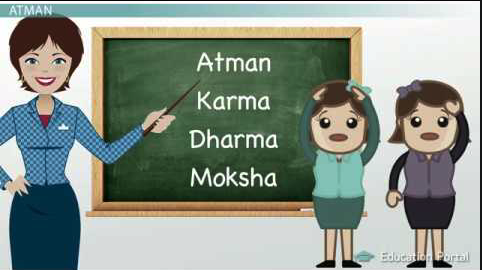This questions and answers document is prepared by a group of Hindu Speakers as a source of information for them or for any one seeking information on Hinduism. There are multiple ways of answering a single question and this group is not claiming to provide all potential answers here.

On Hinduism
The target audience is 9th grader Abrahamic students in American Schools but it will be useful to anyone interested in learning about Hinduism. All answers are designed to answer in about a 3 minute time frame. We have also provided links to other reading materials and video links relating to each question.
Considering Hindu speakers are invariably asked some sensitive geopolitical questions, we have included some potentially sensitive topics here to help speakers answer them from Hindu perspective. However we wish to clarify that this group is composed of Hindus but the group does not have any political affiliation.
Questions starting with “z” are being worked on now. We hope to list some 300 questions and answers below.
If you wish to review these questions and answers in the PDF format, here it is.
If you have any feedback on these QAs, please write to HinduSpeakers@gmail.com. Thank you.

16. Soul
Think of Soul as the life energy within you that moves from one body to another body in the cycle of life and death that we call Samsara. This life energy is a part of the infinite, unbounded energy that prevails the entire cosmos (Parmatama). When one talks about life energy, it is unbounded and not in terms of numbers.
People ask when more births are happening than death, does that mean souls are coming from other life forms (animals, plans, etc.) and the total aggregate number of souls is constant on Earth?
Please know that numbers are only for the physical world, the life force (atma) knows no such physical limit and its arithmetic as the fundamental life force is unbounded and permeates the entire existence.
I have one lit candle. Five people come by and light their candles from my one light. Where have the new flames come from? The rules of physical mathematics do not apply to the spiritual realm.
Can we reach infinite by counting 1, 2, 3 to 100, to 1000, to millions and so on? We will keep counting endlessly but will never reach the Infinite. So the question of the finite number of souls on earth would not be a valid one as soul is an infinitesimal part of this unbounded infinite energy and we can not count in terms of numbers.
Source: Sadhguru Satsang
Other reading material:
Relevant videos: Swami Nikhil Anand Is the soul of an ant bigger than the soul of a whale?,
Contributor: Vikas Gupta
According to Hindu scriptures, there is no death for the soul. The human soul (jīvātma) is considered to be of the same essence as the Divine Supreme Soul (paramātma), also termed as Consciousness. Hence the soul, in the Hindu context, is eternal, imperishable, changeless, and that which illumines everything.
The soul can be thought of as a source of light. While the furniture in a room might keep changing, the reason one can see and experience these items is due to the presence of the light. Similarly, we are able to perceive, feel and think in the world because of our soul.
Lord Krishna declares in the Bhagavad Gita, Chapter 2, Verse 20:
na jāyate mriyate vā kadāchin nāyaṁ bhūtvā bhavitā vā na bhūyaḥ
ajo nityaḥ śhāśhvato ’yaṁ purāṇo na hanyate hanyamāne śharīre
The soul is neither born, nor does it ever die; nor having once existed, does it ever cease to be. It is without birth, eternal, immortal, and ageless. The soul is not destroyed when the body is destroyed.
Thus, Hindu theologians conclude that the soul does not die. When a person passes on, their body decays, mind stops thinking, but the soul, however, continues to exist. It leaves the body and moves onto a different realm of experience, based on what that particular soul needs for evolution. This is valid for all living beings, and not just humans. It is due to this belief system that Hindus propound the theory of karma and reincarnation. The soul evolves by taking on different births, until it reaches spiritual maturity and finally merges with the Divine Consciousness. This, liberation (moksha), is the goal of life on earth.
Other reading material: Reincarnation: WHO is it that Travels? Atma? Jiva? Subtle body?
Relevant videos: Swami Nikhil Anand Hinduism Q & A: What happens when we die?, Hinduism Q & A: Can the soul die?, Hinduism Q & A: What is Reincarnation?,
Contributor: Lakshmi Subramanian
Just as the combination of many strong and weak, visible and invisible forms of energy gives rise to waves in an ocean, the brahman/atma (energy) gives life to entities around us and including us. Why were the waves created? We don’t know. Why were souls created? We don’t know. It just is.
GOD didn’t create souls. Souls existed in the past, exist in the present and will exist in the future
na jāyate mriyate vā kadāchin
nāyaṁ bhūtvā bhavitā vā na bhūyaḥ
ajo nityaḥ śhāśhvato ’yaṁ purāṇo
na hanyate hanyamāne śharīre
The soul is neither born, nor does it ever die; nor having once existed, does it ever cease to be. The soul is without birth, eternal, immortal, and ageless. It is not destroyed when the body is destroyed.
Other reading material:
Relevant videos: Swami Nikhil Anand Hinduism Q & A: Why did God create souls?
Contributor: Rajeev Singh
Not every soul (Atman) that is manifested is incarnate in human form at any given time. Aside from the souls that are now embodied in the plant and animal kingdom, there are other spheres of existence where souls reside. And souls are consistently emanating from Divinity. The Hindu scriptures do not place an exact number of souls, either in the created universe or beyond.
.
Other reading material: Reincarnation: WHO is it that Travels? Atma? Jiva? Subtle body?
Relevant videos: Swami Nikhil Anand Hinduism Q & A: How many souls are there?,
Contributor: Fred Stella
Soul or Atman is an eternal entity that animates the life of all living creatures. The divinity of the soul gives life (consciousness or life installed by the prana) to the creature. A soul is like a powerful small light, illuminating the entire dark room. All souls, that of an ant or a whale, are inherently the same.
According to Svetasvatara Upanishad (5.9) the size of the soul is ten-thousandth part of the tip of the hair.
balagra sata bhagasya
satadha kalpitasya ca
bhago jivah sa vijneyah
sa canantyaya kalpate ||
Translation: When the upper tip of a hair follicle is divided into one hundred parts and again each of such parts is further divided into one hundred parts, each such part is the size of the soul.
.
Other reading material:
Relevant videos: Swami Nikhil Anand Hinduism Q & A: Is the soul of an ant bigger than the soul of a whale?, Hinduism Q & A: What is the size of the soul?
Contributor: Dilip Amin
Soul or Atman is an eternal entity that animates the life of all living creatures. Human beings, therefore, do not stand in an exclusive position in this regard. Every single creature, both giant and small, including insects and microscopic organisms, possesses a soul. Yes, all souls are inherently the same.
Different souls have different sense-capability. Examples of one-sense living entities would include various types of plant life. A two-sense living being would include life forms such as shellfish and worms; a three-sense creature would include ants and snails; a four-sense life forms would include various types of flying insect, such as bees and butterflies; and a five-sense living being would include humans, as well as animals. Even so, all souls are inherently the same.
Other reading material:
Relevant videos: Swami Nikhil Anand Hinduism Q & A: Are All Souls Equal
Contributor: Dilip Amin
URL of this page: hinduspeakers.org/ufaqs/are-all-souls-equal/
